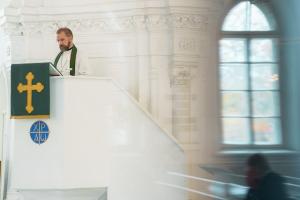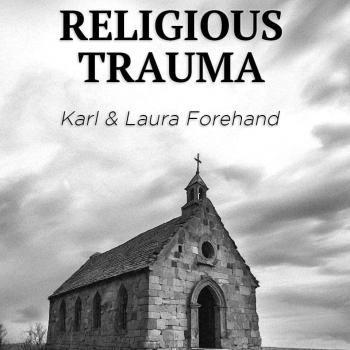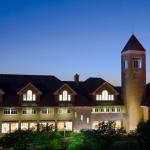
Since the release of our book, Out Into the Desert, I’ve been writing blogs and having discussions about organized religion in the 21st century. We’ve received a lot of feedback and, surprisingly, not everyone agrees. LOL Believe it or not, I’m okay with that–I just wanted to have a discussion.
But this discussion is sure to be an electric one. I know who will have the most visceral reaction, but I think we should still have the conversation anyway.
We find ourselves in an interesting time in history. Brad Jersak calls it The Great Deconstruction, where people are questioning everything. Since we were raised to not question the pastor, we often just quietly move on with our spiritual exploration and ignore this question all together.
Do we really need clergy in the 21st century?
When I learned to do Greek word studies, it required several books. I had to go to the library and check out 5-7 books if I didn’t have them. Friends would use an interlinear Bible as sort of a shortcut which later became a very thick book by Zodhiates that made it much simpler to do word studies. It’s even simpler now on my smartphone.
I type “Lexicon Luke 19:22′ and I see this:

The links lead to tons of useful information. This types of resources, with a little bit of practice, make things like word study so simple I don’t have to take anyone’s word for it, I can look it up for myself. Commentaries and other resources are as easy as speaking into our smartphones.
But don’t we need a shepherd?
I believe in wise counsel. I really do. If there was an actual guru up on the mountain in the town I live in, I would make the journey and go to see what they had to say. Since my father wasn’t always present, I have searched for wise leaders all my life. I am an adventurer, but I still tend to seek out advice.
But does a seminary degree or an ordination qualify someone to be a shepherd or are they even necessary in the 21st century?
In my opinion, most pastors are not adequately trained to advise us. Unmarried Catholic priests cannot understand being married and most pastors have never had any substantial mental health education or clinical mentoring. If they have, we can probably meet with them a month from Thursday if we are lucky.
In my experience, especially “Christian counseling” is biased and shies away from the science in search of a more religious answer. With all the trauma of organized religion, you would think that churches would make trauma counseling a priority–the reality, is that they don’t.
Pastors generally are insulated from the real world. They often don’t get the counseling they need and spiritual bypassing and the dysfunctional nature of organized religion usually makes churches the last place we want to share our issues–I mean, the real ones.
Don’t we need the sermon?
People used to tell me, after the sermon, “Thanks for the fix!” I wanted to tell them the same thing because I got something out of it too. The sermon created a codependent relationship between me and the parishioners. We can try to deny it, but it’s true.
I also used to be proud of the 8 to 10 hours I spent developing a good sermon. The best ones were where I found something in Scripture that we should be afraid of, and then exegeted the proper solution based on my study. I carefully organized and presented the material in an entertaining way, so as to be most effective.
At first, I missed this weekly exercise when I left the church. But as the addiction wore off, I didn’t feel so good about it. It seemed more like manipulation and an unnecessary transaction.
Today when I think about learning about a topic, I go to the internet and find hundreds of the best sermons, lectures and documentaries in the world. They don’t cost me anything, I don’t have to drive anywhere, and I don’t have to settle for what is in my hometown.
I also learn from nature, my interaction with humans, and the time I spend with my dog. I wake up early morning and meditate and think about the things I’m learning and process them through my inner knowing. To go somewhere and have someone tell me what to think seems lazy and irresponsible now. I started it this way recently,
“Maybe we should have spent less time listening to sermons and more time listening to each other.”
Don’t they need to run the church?
This is an easy one, because they don’t. Most small churches stay small because the pastor maintains control. The ones that happen to grow have to have more and more staff and more and more money to support the organization. In reality, it doesn’t work either.
The reason I say that, is because once it becomes an organization, it fails to be an effective organism, and the organization always comes first. Most of the money goes to maintaining the building and paying the staff and putting on the show. The individuals are considered last, especially if they are not a new or potential member.
In essence, the machine creates monsters and the monsters recreate the machines. It’s easy to feel special at first, then totally ignored later. It’s not the pastor’s fault. The traditional design that we’ve reproduced for 1,500 years never worked effectively. We keep hoping it well, but it’s systemically flawed and having an appointed CEO doesn’t do anything to make it better.
So, NO.
It’s time not only for individuals to deconstruct, but the church needs to do the same thing. In my opinion, that starts with significantly reducing the amount of clergy, and eventually eliminating the need for them all together.
As with all the other issues in the church, it would help to take a step back and take some time off ( like a year), and get some perspective. We invite you to join, not only in the evaluation, but in the discussion.
Be where you are,
Be who you are,
Karl Forehand

















